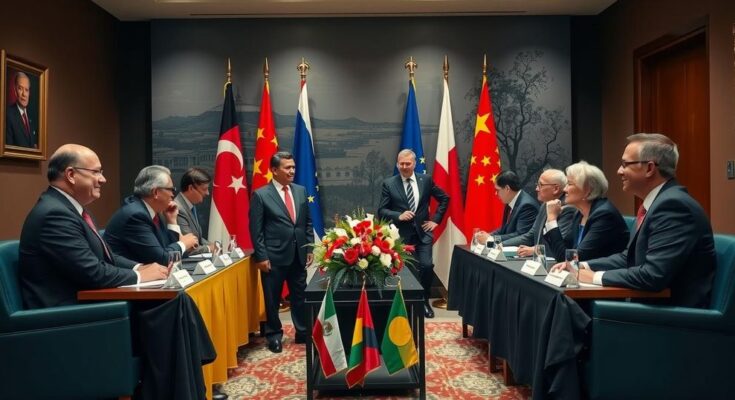Amidst intense global sanctions and isolation due to the Ukraine conflict, President Vladimir Putin is hosting the Brics summit in Kazan with over 20 heads of state, including key allies from China, India, and Iran. The summit aims to demonstrate that Western pressure is failing while facilitating discussions on establishing an alternative to the US dollar for international trade. However, internal divisions within Brics, particularly between China and India, present challenges to achieving collective goals and unity.
In the face of international sanctions and diplomatic isolation following the invasion of Ukraine, Russian President Vladimir Putin is responding by hosting the Brics summit in Kazan, a gathering designed to demonstrate that Western efforts to undermine his regime are ineffective. This high-profile event will convene over 20 heads of state, including influential leaders such as China’s Xi Jinping, Indian Prime Minister Narendra Modi, and Iran’s President Masoud Pezeshkian. The Kremlin has proclaimed this summit as one of the most significant foreign policy events in the nation’s history, with analysts suggesting that it serves a dual purpose: to reinforce Russia’s connections with emerging economies and to project a narrative of resilience against sanctions. The Brics alliance, originally formed by Brazil, Russia, India, China, and South Africa, has expanded to include new members such as Egypt, Ethiopia, Iran, and the United Arab Emirates, collectively representing about 45% of the world’s population and nearly 28% of the global economy. During the summit, discussions will likely revolve around forming alternatives to the US dollar for international trade, a critical need for Russia due to its current economic challenges attributed to dollar dependency. According to Chris Weafer, founding partner of Macro-Advisory, the Kremlin seeks to establish a payment system that circumvents traditional Western currencies to mitigate the effects of sanctions. However, the Brics coalition is not without its internal divisions. Experts caution that the varying interests among member states, particularly between India and China, inhibit collective action and agreement on substantial issues. Jim O’Neill, former Chief Economist at Goldman Sachs, remarks, “In some ways it’s a good job for the West that China and India can never agree about anything.” This lack of cohesion among allies raises questions about the effectiveness of Brics as a counterbalance to Western dominance. Furthermore, the contrasting interests between member nations—like Egypt and Ethiopia, and Iran and Saudi Arabia—underscore the complexities of unifying these disparate states into a cohesive economic bloc. While Putin endeavors to showcase of a united front at the summit, he must navigate the underlying tensions and differing agendas among Brics members. Ultimately, the Kazan summit represents a significant moment for Russia as it attempts to assert its relevance on the global stage amidst ongoing challenges.
The article discusses Vladimir Putin’s hosting of the Brics summit in Kazan, which is viewed as a strategic move to assert Russia’s position in the face of Western sanctions and diplomatic isolation following its military actions in Ukraine. Brics, initially created as a group comprising five major emerging economies, has expanded to include several other nations, reflecting an effort to challenge the dominance of Western powers and the US dollar in global trade. The summit aims to display Russia’s resilience and foster relationships with other countries that may be critical of Western-led policies.
In conclusion, while the Brics summit offers Russia a platform to project an image of unity and resilience, significant internal divisions and geopolitical complexities may hinder the group’s effectiveness as a counterbalance to Western influence. China and India’s rivalry, along with tensions among new members, suggest that achieving substantive agreements will be a formidable challenge for Putin as he seeks to navigate this complex web of alliances.
Original Source: www.bbc.com




